- Grid Infrastructure
- Just Transition
- Renewable Energy Innovation
- Siting & Permitting Reform
- Tax Incentives & Appropriations
- Transmission & Power Markets
- Blog
A Deep Dive on Renewable Energy Policy at ACORE’s First-Ever Virtual Policy Forum
With a new administration focused as never before on climate, a changing Congress and the ongoing pandemic, the American Council on Renewable Energy (ACORE) hosted its Policy Forum on March 10-11, for the first time in a virtual environment. Attended by nearly 500 industry participants, the event convened leaders from across government and the renewable energy industry for an outlook on executive, regulatory and legislative action in the coming year.
Day 1
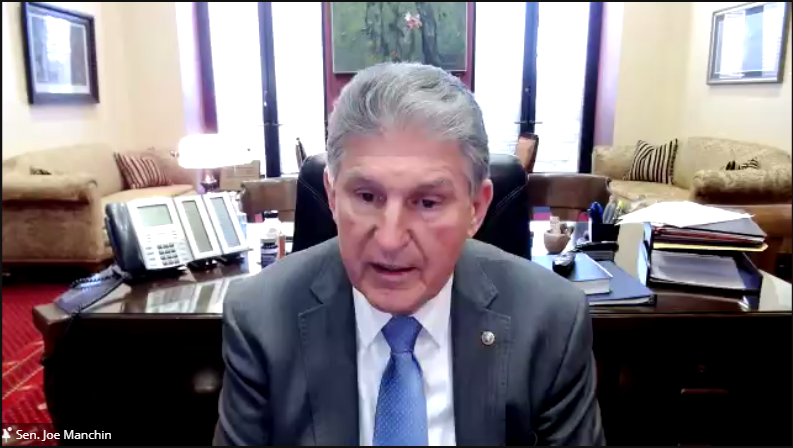
Welcome & Keynote Interview with Sen. Joe Manchin
The first day of the conference began with a spirited conversation between Sen. Joe Manchin (D-WV), Chairman of the Senate Committee on Energy & Natural Resources, and Gregory Wetstone, ACORE President and CEO.
Sen. Manchin opened his keynote by stressing the importance of targeted incentives in President Joe Biden’s decarbonization goals and protecting American workers. He highlighted new legislation on advanced manufacturing that would credit clean energy manufacturing facilities located in rural areas as part of a broader effort to ensure that the energy transition’s economic benefits are shared equally with communities in transition. He also noted the value of high-voltage transmission in enhancing grid reliability. When Sen. Manchin pressed Wetstone on the necessity of clean energy tax incentives in the face of cost-competitive solar and wind energy, Wetstone explained renewables are seeking predictability and fairness, noting that renewable incentives are phasing out while coal, oil and gas have received federal incentives for over a century and continue to do so.
“What you’re asking for is a level playing field. You want to be treated the same. And that’s extremely reasonable,” the Senator replied.
Incentives to Unleash the Renewable Economy: Smart Tax Policies and What’s Next
The first panel discussed the possibilities for renewable generation, storage, transmission and technology-neutral tax credits, as well as the continued significance of tax equity markets for project finance. The panel was moderated by Ed Zaelke, Partner at McDermott Will & Emery and featured Bobby Andres, Senior Policy Adviser for the U.S. Senate Finance Committee; David Bridges, Tax Counsel for Congressman Tom Reed (R-NY); Renee Eastman, Senior Director of Federal Affairs at Salt River Project; and Craig Sundstrom, Director of Government and Regulatory Affairs at RWE Renewables.
Panelists addressed the need for a long-term tax strategy with bipartisan support to replace the currently intermittent “start-and-stop” tax incentives. They discussed how tax credit refundability could be more efficient than the current tax equity structure and were optimistic that Congress could pass legislation for refundability of tax credits this year. Panelists also weighed in on how a technology-neutral tax credit could treat different clean energy technologies equitably and incentivize the innovation needed to complete the energy transition. Finally, they spoke about how incentives supporting transmission buildout and standalone storage projects could further advance the transition to a zero-emissions power sector.
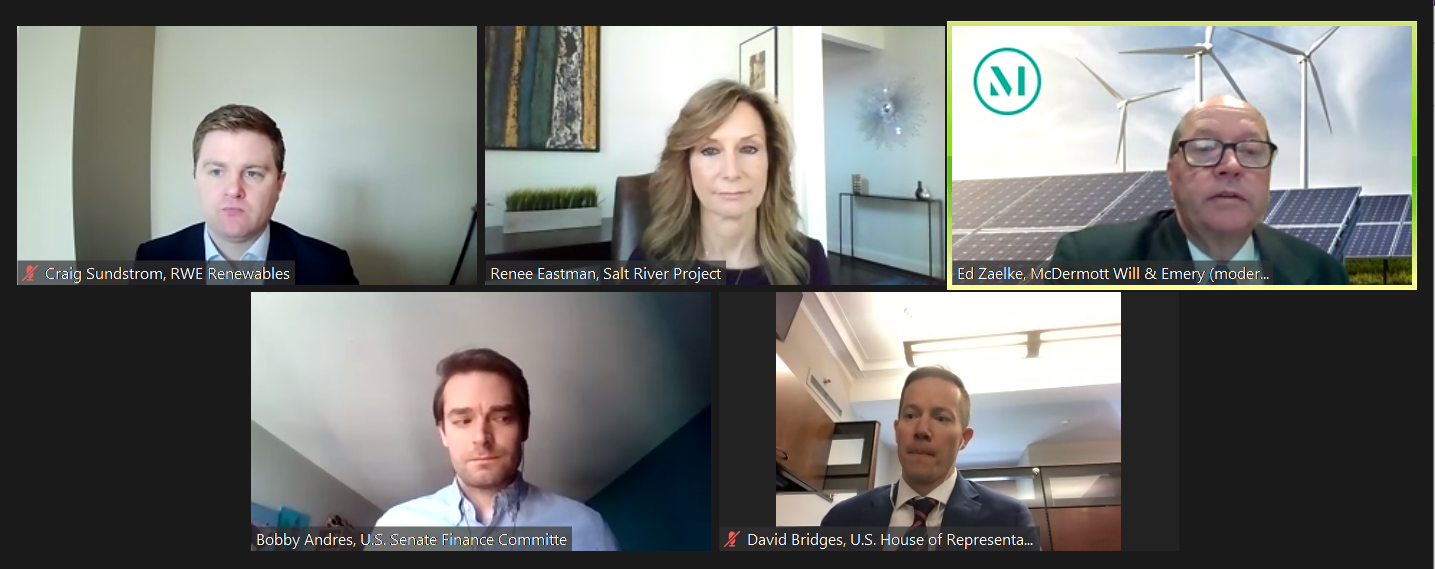
Keynote Remarks by Sen. Ron Wyden
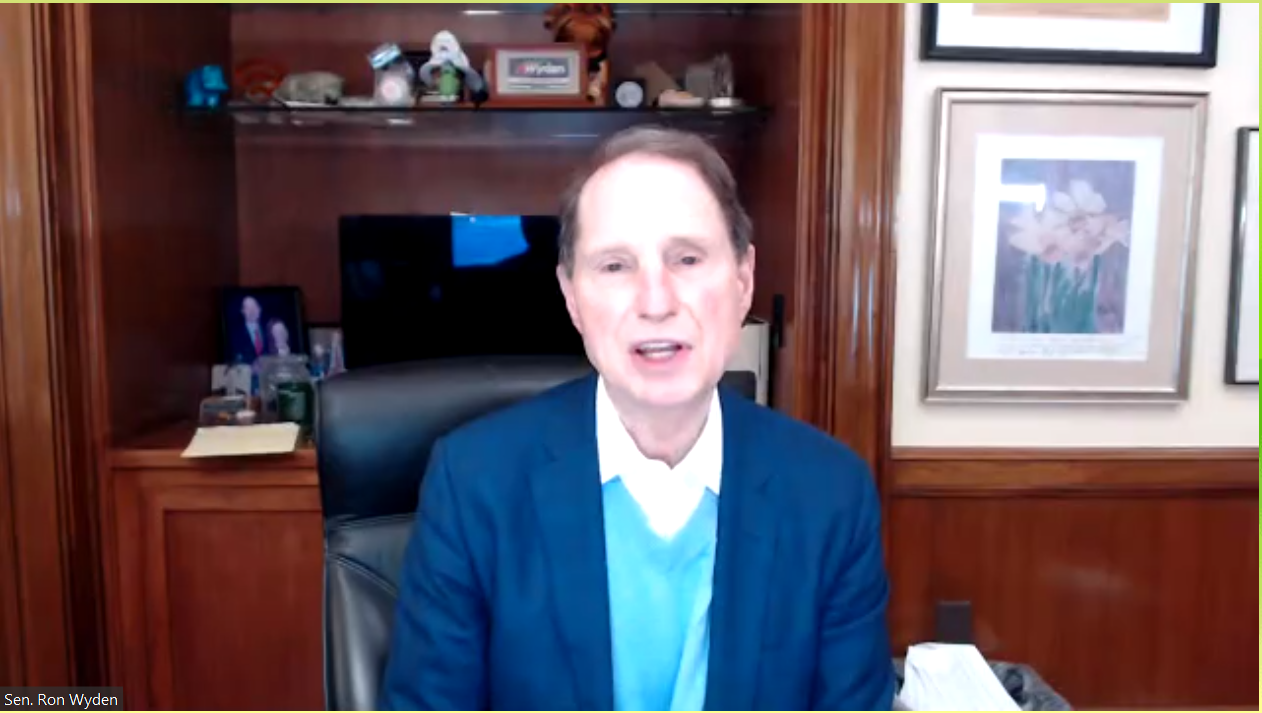
The panel was followed by a keynote speech from Sen. Ron Wyden (D-OR), Chairman of the Senate Committee on Finance.
Sen. Wyden began by describing the recent weather events in Texas as a wake-up call, highlighting the nation’s need to address climate change and rebuild our crumbling infrastructure. The Senator revealed that he would soon be reintroducing his Clean Energy for America Act to consolidate existing energy tax incentives into three technology-neutral programs that encourage clean electricity, clean transportation and energy efficiency. He indicated the legislation would include an incentive for free-standing energy storage, and his office is currently reviewing incentives for other technologies such as high-voltage transmission. Sen. Wyden discussed the importance of monetizing credits, with Wetstone noting that refundability or direct pay would help alleviate constrained tax equity markets.
“Lawmakers have the chance to reset our energy tax system in a way that firmly focuses on the key goal: reducing and eventually eliminating carbon emissions,” Sen. Wyden declared.
Keynote Remarks by U.S. Secretary of Energy Jennifer Granholm
“No more waiting,” Energy Secretary Jennifer Granholm declared in an impassioned address on the Department of Energy (DOE)’s upcoming plans to accelerate the energy transition in the Biden administration.
In her comments, Sec. Granholm emphasized the need to “deploy, deploy, deploy.” She previewed how DOE will fund new clean energy technologies, now further enabled by the relaunch of the Loan Programs Office led by renewable energy entrepreneur Jigar Shah. Additionally, the Secretary noted the world class expertise of the DOE’s national laboratories and used the ACORE Policy Forum to announce the start of construction for the Grid Storage Launchpad, a Pacific Northwest National Laboratory (PNNL) facility designed for clean energy technology development and adaptation.
Sec. Granholm also outlined the Department’s plans to support marginalized communities during the energy transition. She explained there are two categories of communities in need of support: those directly affected by climate change and air pollution, and those affected by a shrinking fossil fuel sector. DOE plans to promote job creation for these communities and support development of an inclusive clean energy workforce.
Regarding efforts to improve the power grid following the blackouts in Texas, Sec. Granholm emphasized the need for transmission expansion and more robust power generation that better anticipates extreme weather events associated with climate change.
She concluded her speech with a Dr. Seuss-inspired poem that quickly went viral on energy Twitter underscoring the urgency of the moment and ACORE’s important role working on behalf of the renewable sector.
“This is our opportunity to build the energy economy back better,” she asserted.
Supporting Diversity, Equity and Inclusion Across the Clean Energy Workforce: Turning Ambitions into Action
The afternoon panel candidly discussed efforts to improve diversity, equity and inclusion within the renewable energy workforce, including ACORE’s new Accelerate membership program. The panel was moderated by Rose McKinney-James, Managing Principal of McKinney-James & Associates and Energy Works LLC, and featured Dana Clare Redden, CEO & Founder of Solar Stewards; Kristal Hansley, CEO & Founder of WeSolar; and Abby Watson, Head of Government Affairs at Siemens Gamesa. Solar Stewards and WeSolar are among 15 companies selected as part of the first cohort of Accelerate members, which was announced earlier that day.
The panel began with a discussion on systemic barriers for people of color. One such barrier in the clean energy sector includes a lack of access to state and local renewable energy resources and programs, such as community solar. Marginalized communities have borne the brunt of climate change impacts, and panelists discussed policy approaches to help address these issues.
The panel also assessed corporate diversity, equity and inclusion goals, and opportunities for organizations in the sector to examine supply chains and leverage purchasing power to help support minority- and women-owned businesses. Announced during the panel was a new program launched by Siemens Gamesa called Future Generations. Future Generations is a comprehensive workforce development program designed to create diverse and equitable workforce pipelines and bolster STEM education in disadvantaged communities.
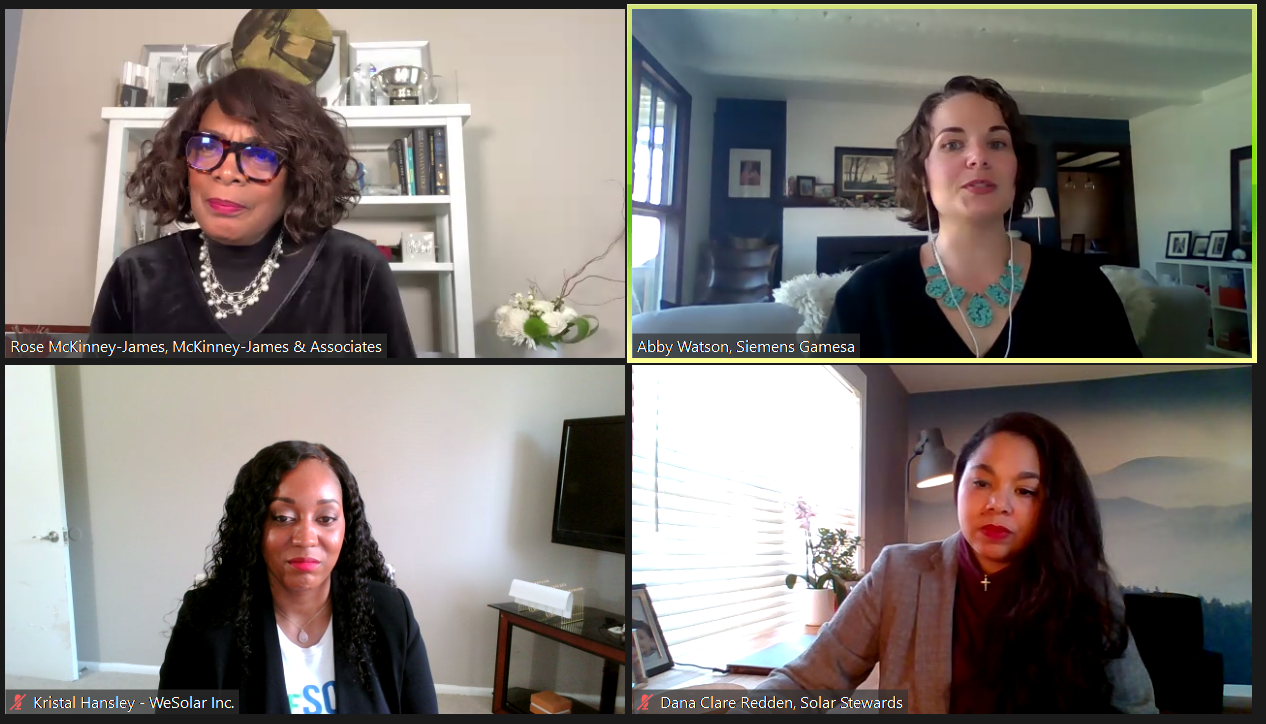
Keynote Remarks by Rep. Steven Horsford
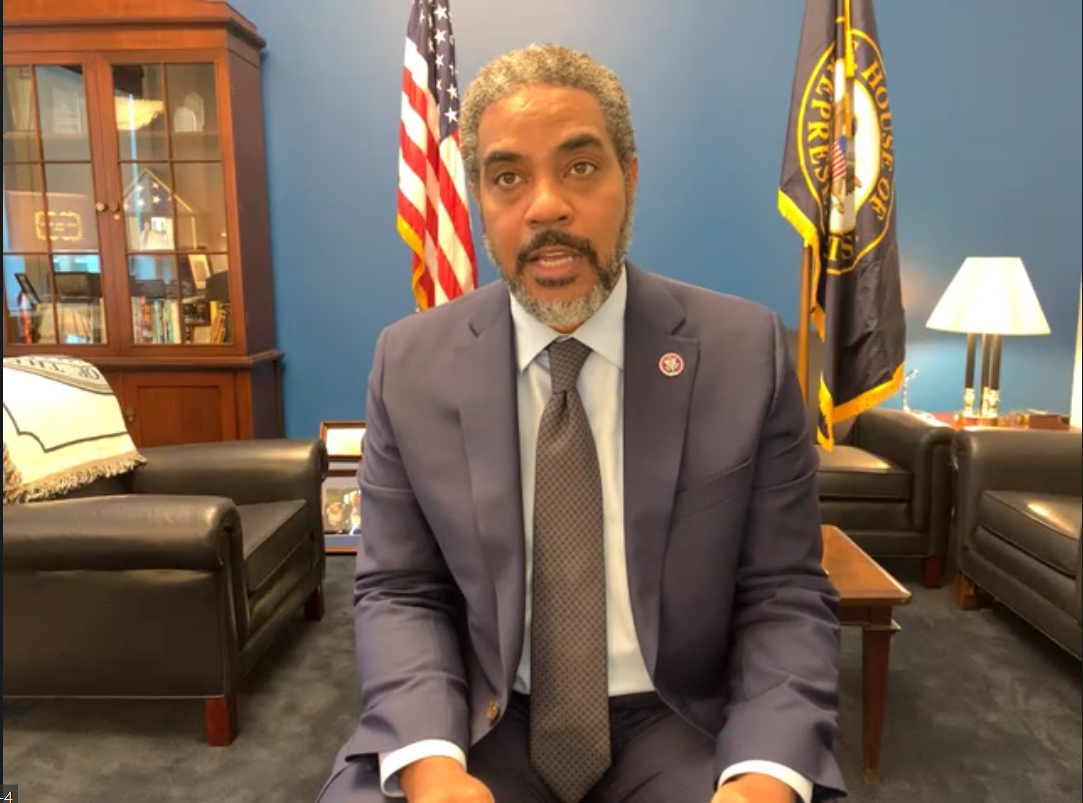
In a keynote interview with ACORE’s Chief Operating Officer Bill Parsons, Rep. Steven Horsford (D-NV) shared his priorities for helping drive Nevada toward a cleaner, more secure and greener future. The Congressman highlighted his original co-sponsorship of the Growing Renewable Energy and Efficiency Now (GREEN) Act, legislation he described as an important starting point for the indispensable role clean energy tax incentives will play as part of a comprehensive federal climate strategy. He also discussed his focus on deploying more renewables on federally managed lands, and his intent to work closely with Interior Secretary Deb Haaland on siting and permitting issues. Rep. Horsford also emphasized his efforts to expand the market for Nevada’s clean energy resources by partnering with Sen. Heinrich to reintroduce the Electric Power Infrastructure Improvement Act. This legislation addresses one of the principal barriers to the continued deployment of clean energy by offering an investment tax credit for the construction of significant transmission projects.
“We have to elevate these issues of permitting, of streamlining the process, of breaking through the barriers of getting the transmission investments in place…as you said, it’s one thing to have the resources in solar and geothermal, it’s another to get it to the end-users, and the only way to do that is through transmission,” the Congressman concluded.
Day 2
Keynote Remarks and Interview with White House National Climate Advisor Gina McCarthy
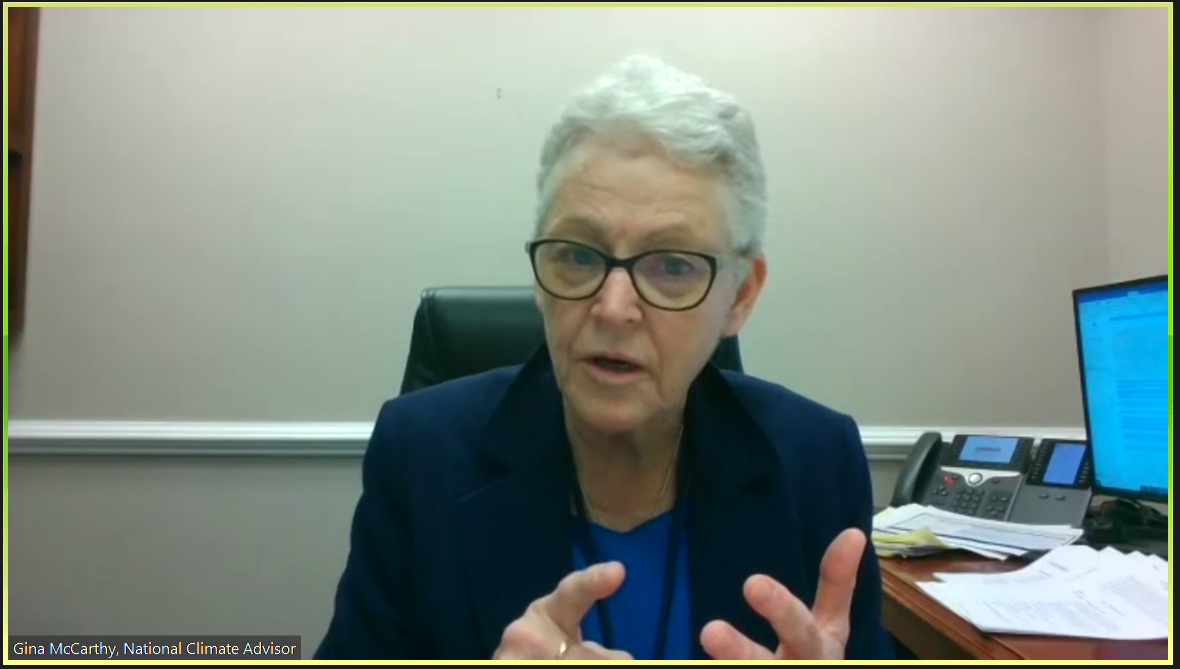
The second day opened with remarks from Gina McCarthy, America’s first-ever National Climate Advisor and former Administrator of the Environmental Protection Agency (EPA).
McCarthy emphasized the importance of job creation as a component of the transition to a clean energy economy and how a “whole-of-government” approach to climate is key to her role. She cited the American Rescue Act – which President Biden signed later that day – as the first step in the journey to growing the American middle class. McCarthy also highlighted the auto and utility sectors as important “leverage points” for America meeting the climate goals President Biden has outlined.
The White House’s Justice40 Initiative, which aims to distribute 40% of the benefits from federal clean energy investments to disadvantaged communities, received special mention. The White House has also created a Task Force for Environmental Justice to help identify the communities who will receive these benefits.
In her remarks, McCarthy also addressed the White House’s plans to revise the United States’ Nationally Determined Contribution (NDC) to the Paris Agreement, which the U.S. recently rejoined. McCarthy indicated how the administration plans to link the NDC to federal goals of achieving emissions-free power by 2035 and a net-zero economy by 2050.
“2030 is an opportunity to recast the position of the U.S. The two big levers that we have between now and 2030 are the auto sector and the utility sector. It’s what we do with our power sector that’s going to matter a lot,” said McCarthy.
Fireside Chat: Regulatory Action to Tackle the Climate Crisis
This fireside chat brought together regulatory experts to examine tools the executive branch can leverage to confront the climate crisis. Todd Glass, Partner at Wilson Sonsini Goodrich & Rosati, moderated the discussion. Participants included Norman Bay, Partner at Willkie Farr & Gallagher LLP and Former FERC Chairman; and Christy Goldfuss, Senior Vice President of Energy and Environment Policy at the Center for American Progress and Former Managing Director at the White House Council on Environmental Quality.
The speakers expressed optimism for the new administration and the outlook for regulatory action. They cited the appointments of FERC Chairman Richard Glick and Energy Secretary Jennifer Granholm as promising for prioritizing renewables integration and jobs growth, respectively.
Bay saw FERC finally enabling greater buildout of interregional transmission by revising Order No. 1000 and heralded the near-term demise of FERC’s renewable-suppressing minimum offer price rule (MOPR), proclaiming that the MOPR “cannot stand.” The former Chairman also pointed out the available authority under Section 1222 of the Energy Policy Act of 2005 as a possible tool to build new, clean energy-integrated transmission lines.
Goldfuss emphasized the importance of a “back-to-basics” science agenda at the EPA before proceeding to a more substantive follow-up to the Obama-era Clean Power Plan. She also highlighted the potential of responsibly leveraging new permitting policies to reach President Biden’s 2035 goal for an emissions-free power sector.
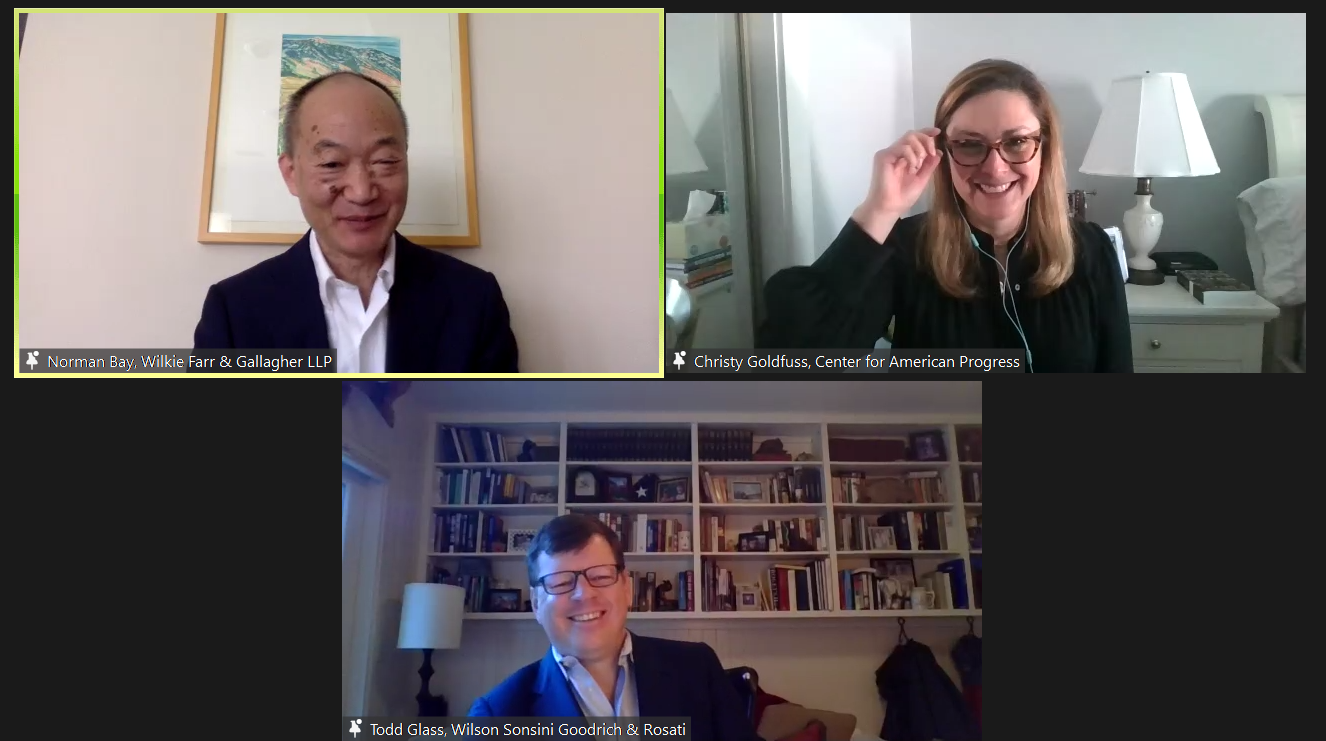
Keynote Remarks by FERC Commissioner Allison Clements
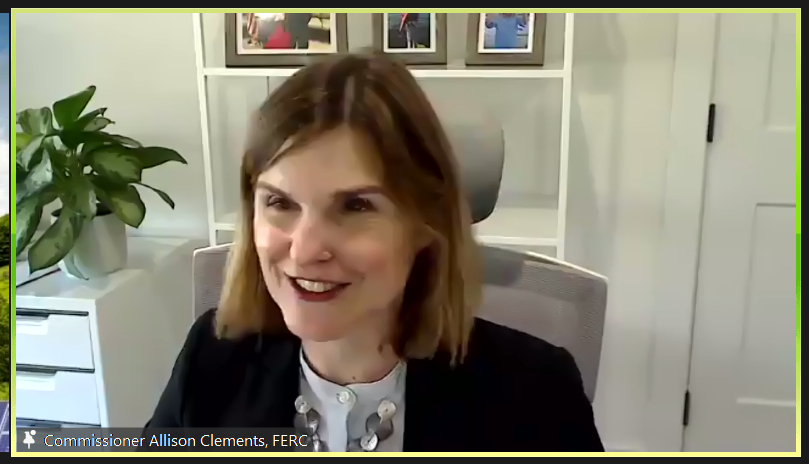
After a networking break, FERC Commissioner Allison Clements joined the ACORE Policy Forum for a keynote interview with ACORE President and CEO Gregory Wetstone.
Commissioner Clements began by highlighting the Commission’s March 23 technical conference on resource adequacy and stated she would be contemplating how to build durable market designs that respect both state policy and consumer preference. Separately, the Commissioner made public her view that FERC could welcome state and regional proposals on wholesale market-level carbon pricing.
When discussing the Texas blackouts, Clements proclaimed, “the Commission is ready and willing to act” on grid reliability if others do not. The Commissioner also talked about the need to continue alleviating market barriers for emerging clean energy resources. Regarding FERC’s new Office of Public Participation, Clements called the office an important tool for lessening structural imbalances in the stakeholder process and encouraged the renewable energy industry to follow its efforts. Understanding how bottlenecks in transmission capacity and interconnection queues have led to hundreds of gigawatts of planned renewable energy generation stuck in queues nationwide, Clements highlighted the need for transmission planning and interconnection reform.
“We are now at the moment for the next step in broader transmission planning and cost-allocation reform. I think every living FERC chair has made that point,” the Commissioner said, suggesting that the time is finally ripe for action on these issues.
Priorities for an Infrastructure Plan
The afternoon panel discussed how transmission expansion, EV infrastructure, green hydrogen and other clean technologies can boost access to renewables as integral components of an effective infrastructure plan. The panel was moderated by Larry Eisenstat, Partner and Energy Group Chair at Crowell & Moring LLP, and featured Christina Hayes, Vice President of Federal Regulatory Affairs at Berkshire Hathaway Energy; Scott Hennessey, Vice President of Federal Policy at Brookfield Renewable; Bill Murray, Senior Vice President of Corporate Affairs & Communications at Dominion Energy; and Susan Nickey, Executive Vice President & Chief Client Officer at Hannon Armstrong.
The panelists started with a discussion on the importance of tax incentives for shovel-ready transmission projects as an immediate solution to expanding infrastructure. Panelists also highlighted how carbon pricing can be a key policy tool to attract capital for infrastructure investment. The panel emphasized the importance of continued federal investment in research and development to expand battery and hydro energy storage to continue integrating renewable energy into the grid, and cited the need for an upgraded infrastructure that is up to the task of charging electric vehicles.
Since practices have typically changed between administrations, the panelists brought up the important role of consistent siting and permitting in enabling infrastructure development. For transmission, FERC could coordinate the siting and permitting functions of multiple federal agencies.
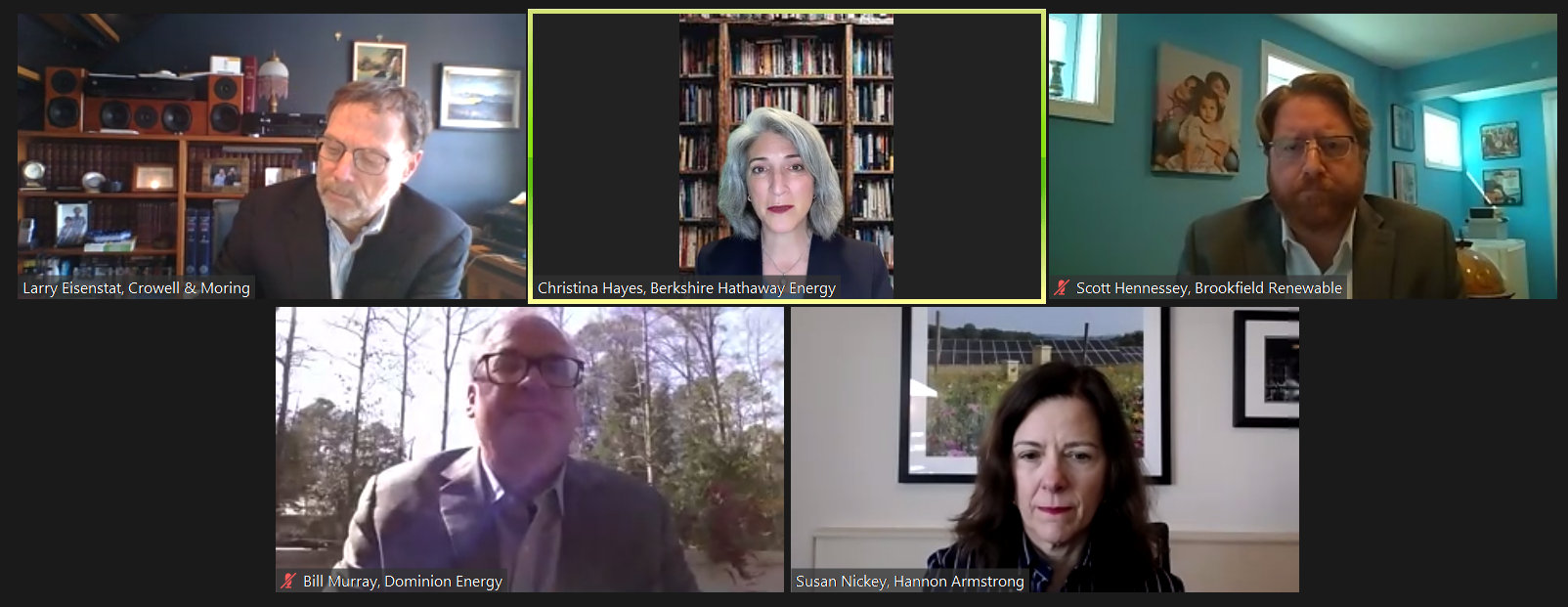
Keynote Interview & Closing Remarks with Rep. John Curtis
ACORE’s Policy Forum concluded with a keynote address and interview with Rep. John Curtis (R-UT) conducted by Heather Reams, Executive Director of Citizens for Responsible Energy Solutions (CRES).
Rep. Curtis discussed how Republicans in Congress can engage in clean energy advocacy, encouraging Democrats to reach out for Republican support. The Congressman highlighted the compatibility between a capitalist economy and clean energy, saying modern infrastructure should be able to accommodate autonomous vehicles. He also observed that, while there is a role for government regulation in clean energy policy, shareholder activism in the private sector is very effective in affecting corporate behavior.
“If you are a capitalist, you should love clean energy,” Rep. Curtis declared.

On behalf of the ACORE team, thank you to all who were able to attend the ACORE Policy Forum. Those who registered for the conference but did not get a chance to attend all of the sessions can watch the program on our conference hub until April 10, 2021. Those who missed the chance to register and would like to access the content can reach out to events@acore.org to inquire about purchasing a post-event pass.
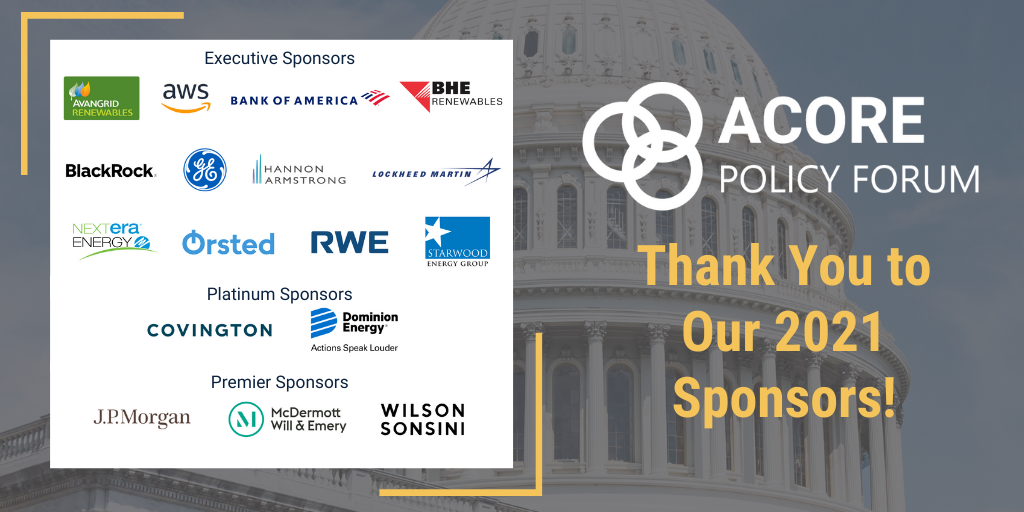
Join leaders from across the renewable energy sector.

What will our next 20 years look like? Here’s the truth: they’ll be better with ACORE at the forefront of energy policy.
Shannon Kellogg
Amazon Web Services (AWS)
